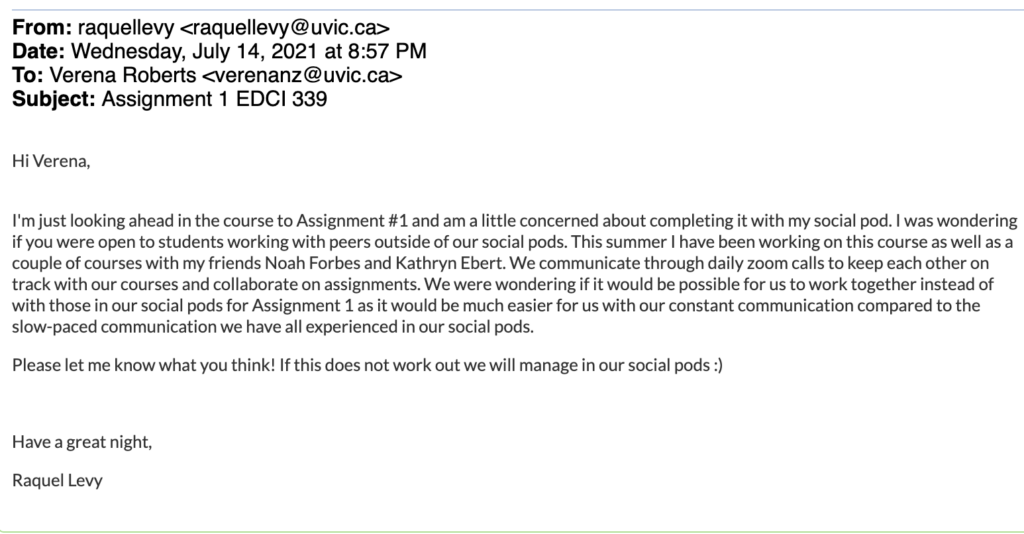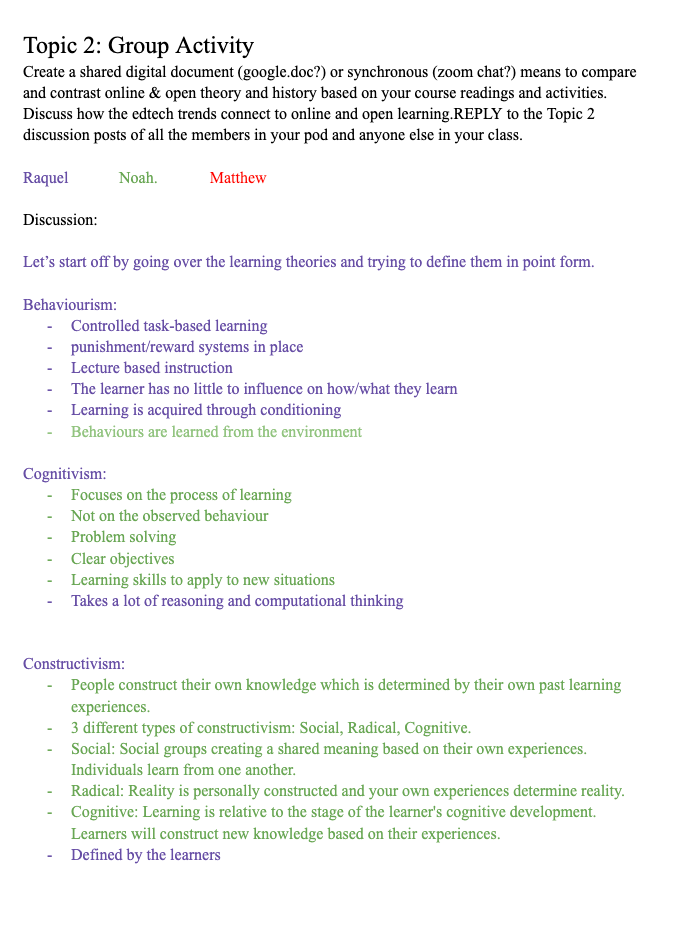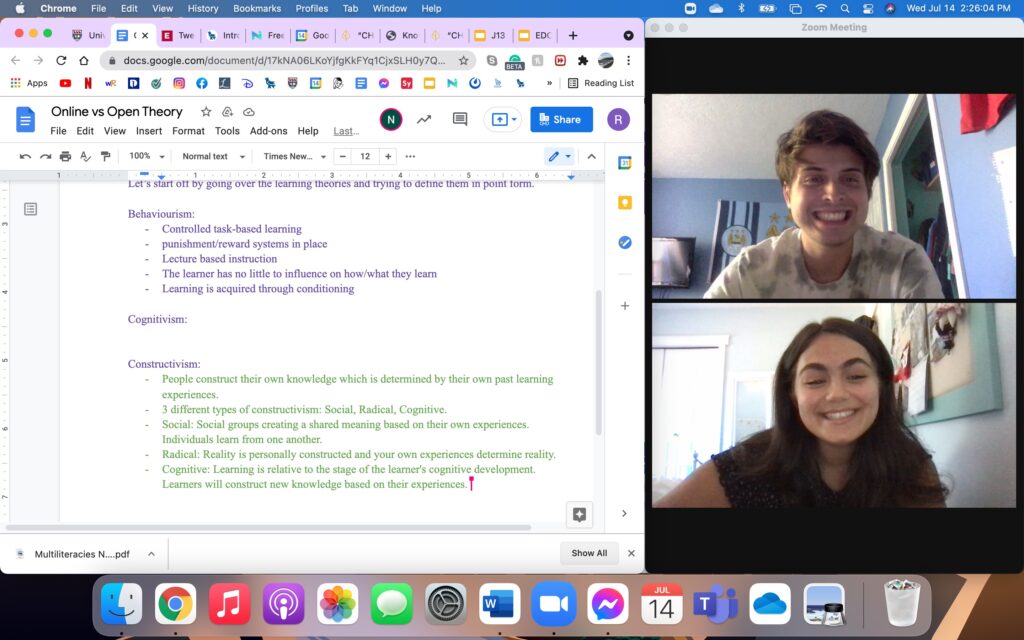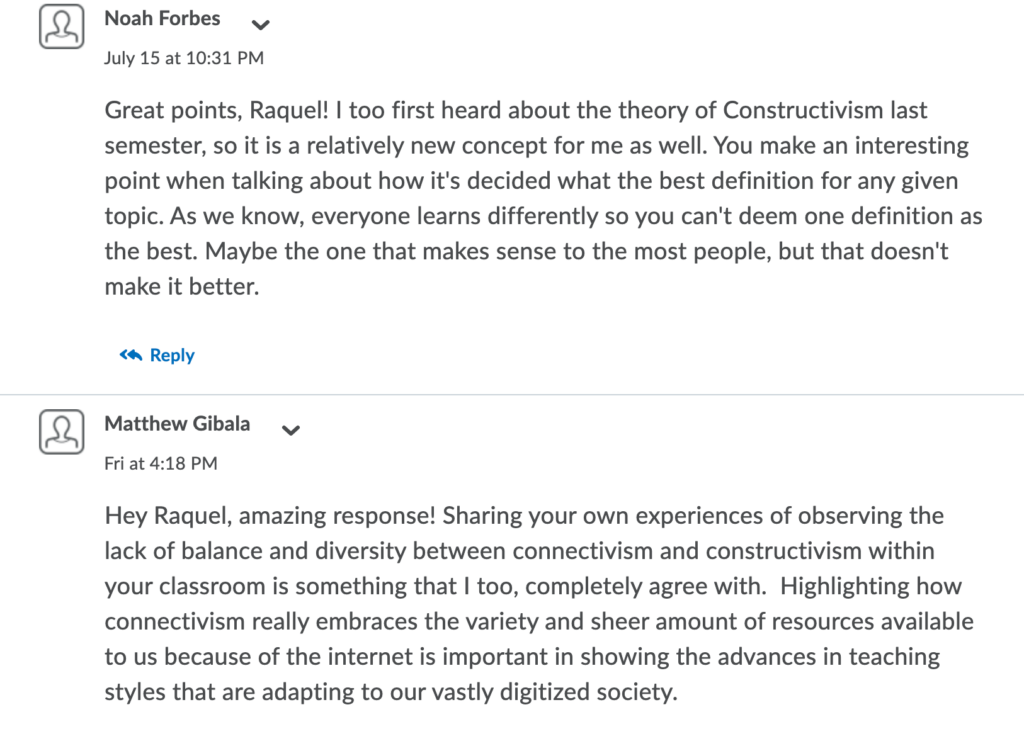





Individual Discussion Post:
Prompt – What are the similarities and differences between constructivism and connectivism? Which “edtech trend” interested you the most from Weller’s (2018) article and why? How does your chosen “edtech trend” relate to constructivism or connectivism and why? What did you already know about the topic, what do you know now based on the course readings and activities, what do you hope to learn?
Constructivism and Connectivism are both learning theories that I believe in and plan on integrating into my future teaching practices. I think that the main similarity between constructivism and connectivism is that they both rely on past experiences and social connections.
Last semester was the first time I heard about Constructivism and have been very interested in this learning theory ever since. I think that when it comes to the traditional transmissive teaching styles that I grew up with, there was a complete lack of acknowledgment for the learning that comes along with a conversation. As mentioned in the Weller article, this is not to say that there is no value in a more transmissive style of teaching. I just feel that in the school system I grew up with there was a lack of balance between the two styles. The constructivism theory of learning does a great job of explaining the value of introducing dialogue into the classroom. Making education about not only the material but the person learning the material creates a much more holistic learning experience that I believe is very important for learners of all ages.
Connectivism, unlike Constructivism, is a brand new theory to me. Where Constructivism is all about conversation and interpersonal communication, Connectivism finds information elsewhere. Connectivism believes that “learning may reside in non-human appliances” (Weller, 2020). Living in the digital age that we do, I think that it’s impossible to ignore the power that comes with being able to research anything at any time without limitations. Connectivism embraces the diversity of sources and endless possibilities that come from virtual spaces. It’s social in the way that social media is where people can throw out ideas into the void of the internet and see what they can get back. Whereas constructivism is more of a private direct social interaction that relies more on the information found within those engaging in the dialogue rather than outside sources.
Lastly, the edTech trend that is found the most interesting in the reading was the learning objects from 2000. It really caught my attention because I had never really thought about the idea of creating one learning object to teach a concrete topic. For example, having one video that explains how to do long division that everybody watches to be able to understand that concept. The idea of having one designated entity that can be used, reused, and referenced during technology-supported learning is quite interesting. On the one hand, when it comes to teaching and learning, especially online where students are already accustomed to consuming online content, why are we continuing to teach the exact same topics again and again? On the other hand, I found it very interesting to ponder the problems that may arise when it comes to learning objects like these. Like who decides what the best definition of any given topic is? What is the best way to teach the information? Where is the line between objective and subjective topics of creating learning objects for?
As for how connectivism and constructivism relate to these learning objects, I don’t see much correlation. I think that learning objects do have someplace in connectivism as digital resources for the learner however they don’t support social learning. Yet, I don’t view learning objects as having anything to do with constructivist learning.
Resources:
Weller, M. (2020). Chapter 4 – Constructivism. 25 Years of Edtech. AU Press. Retrieved from https://read.aupress.ca/read/25-years-of-ed-tech/section/0442be0f-0347-40eb-9c19-de80b7e13d47#ch04
Weller, M. (2020). Chapter 17 –Connectivism. 25 Years of Edtech. AU Press. Retrieved from https://read.aupress.ca/read/25-years-of-ed-tech/section/198057f5-1a3e-4436-a4b8-c6e1a3e0bd69#ch17
Weller, M. (2018, August). Twenty Years of Edtech. EDUCAUSE Review, 53(4). Retrieved from https://er.educause.edu/articles/2018/7/twenty-years-of-edtech